Energy efficiency and sustainability have become a hot issue of global concern. With rapid industrialization and urbanization, the demand for energy is increasing, and traditional fossil fuels not only have limited resources but also produce large amounts of greenhouse gases and pollutants during combustion, which have serious impacts on the environment and climate. have limited resources and Therefore, choosing the right fuel is critical to achieving energy efficiency and sustainability.
As carbon emissions from traditional fossil fuels continue to rise, we must move to cleaner, more sustainable alternatives. This is where biomass comes into play as a renewable energy source.
Compared to fossil fuels such as coal and oil, which emit large amounts of carbon dioxide when burned, biomass produces significantly lower levels of greenhouse gases because the carbon absorbed during photosynthesis in its natural cycle is released when it is burned. In addition, unlike finite fossil fuels, biomass can be an inexhaustible source of clean energy with great potential for sustainability. In addition to being environmentally friendly and sustainable, biomass can be used in various forms, such as solid pellets or chips for heating systems, or converted into liquid biofuels for transportation purposes, such as ethanol and biodiesel.
Of course, as with any other energy source, biomass has challenges, such as the costs involved in efficient harvesting and processing on a large scale. However, with advances in technology and continued research, these challenges can be overcome.
What are biomass fuels?
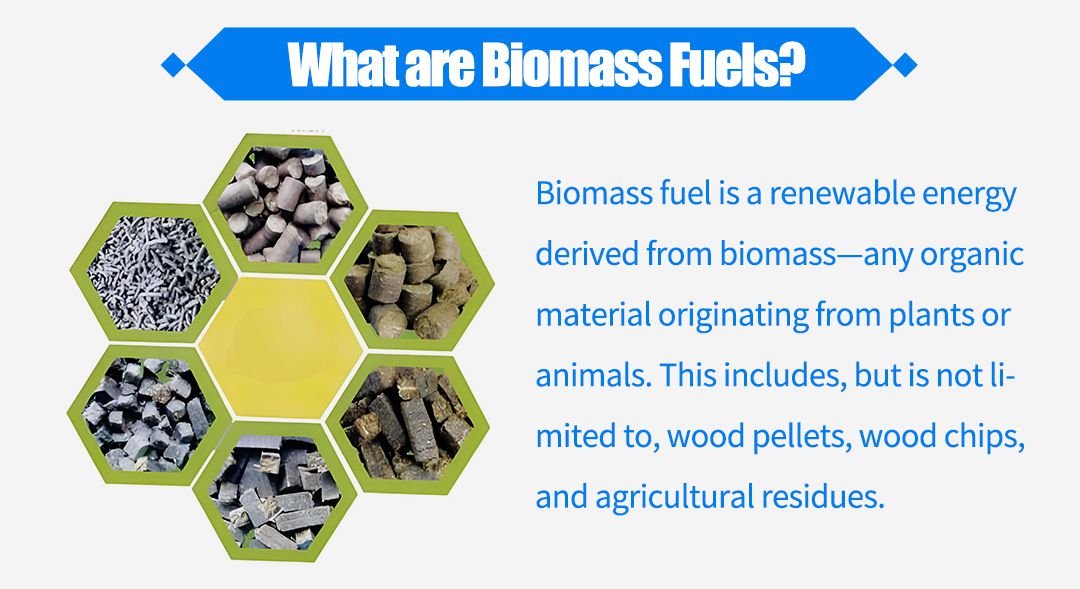
Biomass fuels are a renewable energy source that comes from biomass - any organic material from plants or animals. This includes, but is not limited to, wood pellets, wood chips, crop residues, and more. It is widely used as a sustainable energy alternative to traditional fossil fuels, making it an important option to address global climate change and energy security issues.
It has become common practice to use biomass fuels in boilers. Wood pellets are made from small fragments produced during compression and are more suitable for small-scale processing; wood chips need to be cut through to size and dried before they can be used; and crop residues refer to salary and tea residue etc. produced during the manufacturing process of surplus crops and their products.
In addition to the above biomass, there are many more that can be used to generate energy or processed into secondary product categories such as oil-free palm seed husk, rice husk, and waste forest industry resources.
Biomass fuels are an important energy option that can help reduce our dependence on finite resources, as well as reduce greenhouse gas emissions and environmental pollution. As technology continues to advance and applications expand, it is believed that more types of biomass fuels will be developed in the future and provide cleaner, sustainable energy solutions.
Comparison of Fuel Types
To have a more comprehensive understanding of the performance of biomass, we compare it with traditional fossil energy sources such as natural gas, oil, and coal, as well as other renewable energy sources, and analyze the applicability of biomass in different application scenarios and its ability to integrate with other energy sources.
1:Comparison Between Biomass and Natural Gas
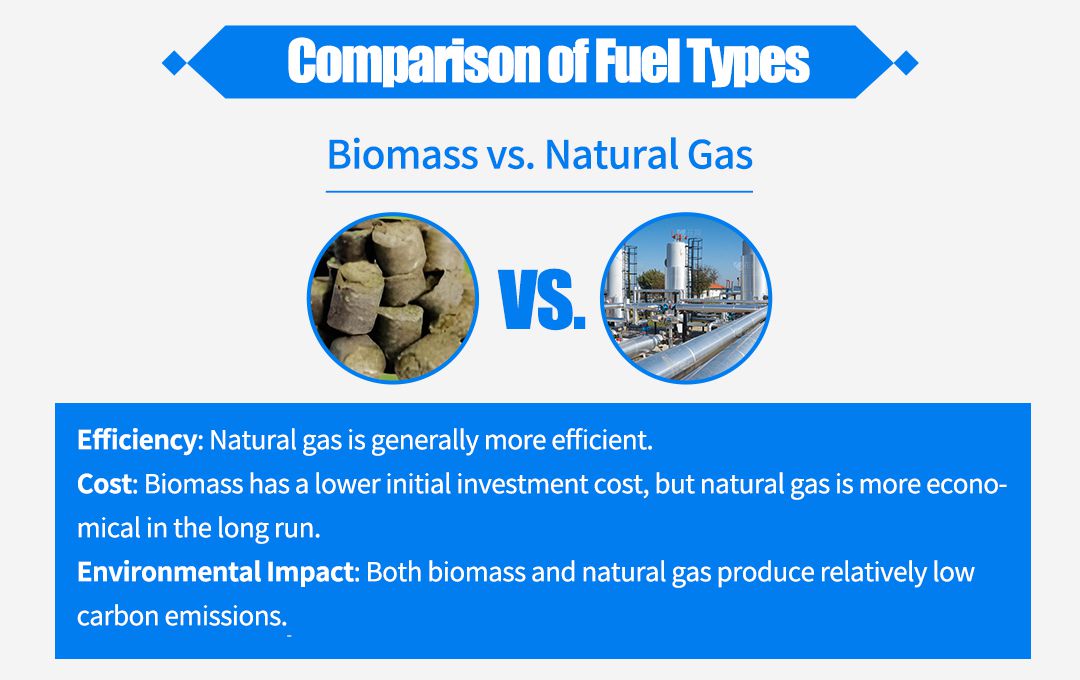
Efficiency: Both biomass and natural gas have a high energy content, and the calorific value of biomass is even slightly higher than that of natural gas. However, when it comes to converting these fuels into usable energy, natural gas leads the way due to its advanced technology in the extraction and combustion process. This means that natural gas is more efficient overall compared to biomass.
Cost: When considering initial investment costs, biomass tends to be less expensive than natural gas due to its renewability and abundance in some parts of the world. However, when considering long-term costs, including maintenance and operating expenses, natural gas may be more economical due to its efficient use of resources.
Environmental impact: Biomass and natural gas produce significantly fewer carbon emissions than conventional fuels such as oil or coal. Biomass has the advantage of being a carbon-neutral fuel source because it absorbs the same amount of carbon dioxide during growth as it releases during combustion. The extraction of natural gas, on the other hand, poses certain safety risks, and measures such as extensive monitoring systems are needed to eliminate this problem to a large extent.
2 . Comparison of Biomass with Oil and Coal
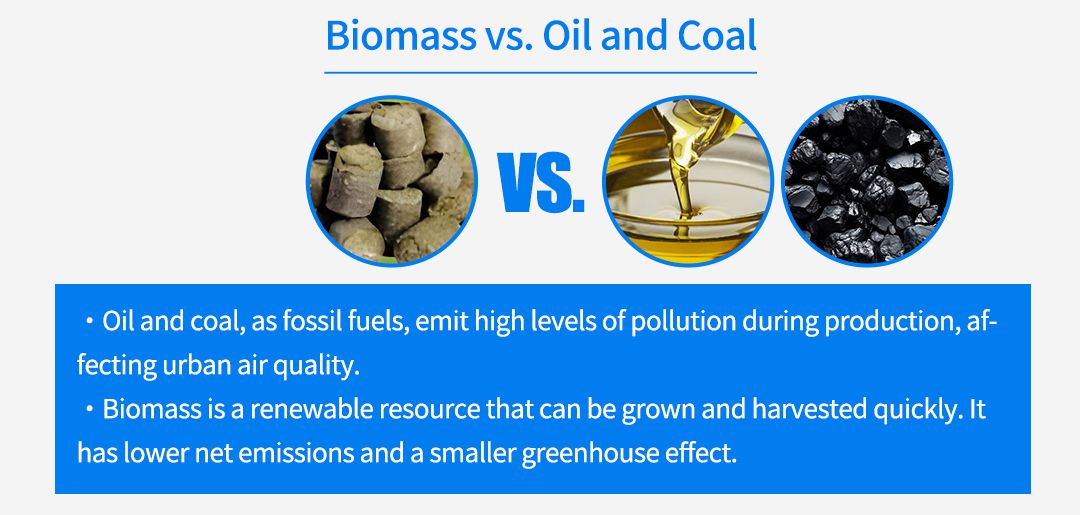
Although both fossil fuels, oil, and coal, are highly utilized globally, they also produce high levels of pollution when burned for energy production, greatly contributing to air pollution levels around major cities around the world.
Biomass is a renewable energy source, which means it can be constantly replenished through natural processes. Unlike fossil fuels, which take millions of years to form, biomass can be grown and harvested in a short period. This not only makes it a more sustainable option but also removes our heavy reliance on finite resources such as coal or oil.
3. Comparison of Biomass with Other Renewable Energy Sources
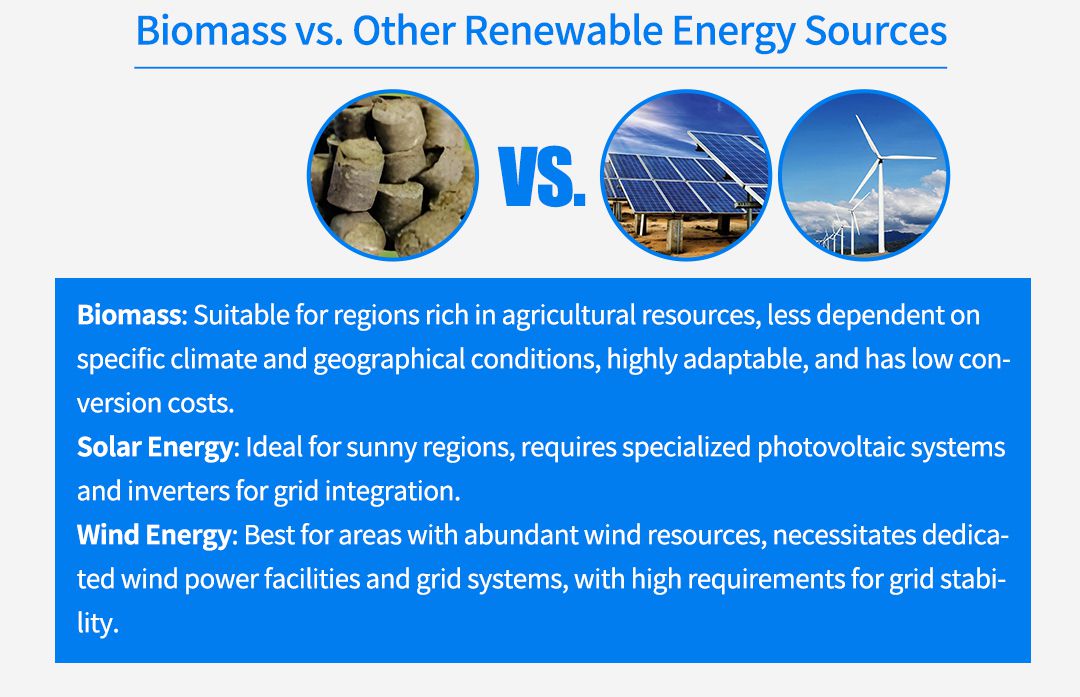
In terms of applications and integration with other renewable energy sources, biomass offers excellent opportunities for cogeneration - producing electricity and heat at the same time. It can be used in combination with solar or wind energy to balance its intermittency. This overall creates a more efficient and reliable system.
However, one must also consider the regulatory challenges associated with using biomass as a fuel source. Due to its renewable nature, there are strict regulations on land use for growing bioenergy crops - making it critical for companies to adhere to responsible agricultural practices.
In conclusion, while both biomass and natural gas have their advantages over each other, their lower environmental impact makes them both promising alternatives to traditional fuels such as oil or coal. However, sustainability should always be at the forefront when considering long-term solutions to energy needs. As technology advances and stricter regulations are put in place, we can pave the way for a cleaner, more sustainable future through the use of alternative fuels such as biomass and other renewable energy sources such as solar or wind.
Efficiency and Cost-Effectiveness
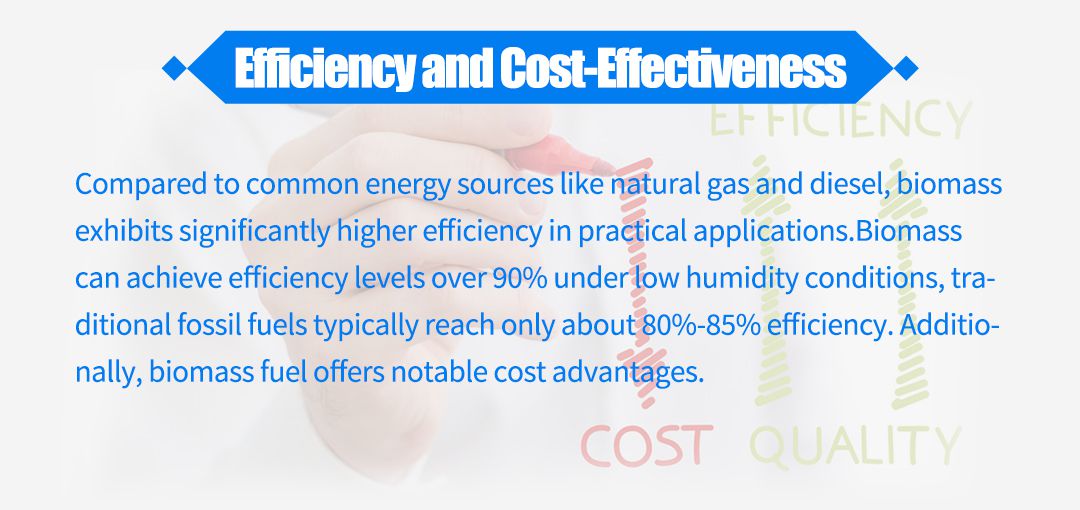
Under severe environmental and resource challenges, the search for sustainable, environmentally friendly, and cost-effective energy solutions has become a global consensus. The potential of biomass as an abundant and renewable energy resource cannot be ignored. Before considering a biomass boiler, there may be concerns about its high efficiency and cost-effectiveness.
Biomass is compared with other common energy sources such as natural gas, diesel, etc., in the practical application of the high-efficiency characteristics. According to relevant data analysis, biomass can achieve high efficiency of more than 90% under lower humidity conditions, and even more than 95% after optimized design. This is mainly due to innovative measures such as exhaust gas recovery technology and multi-stage residual utilization systems. In contrast, conventional fossil energy sources often only reach around 80-85%.
In addition to this, biomass fuels have a clear advantage in terms of cost of use. It is well known that traditional chemicals such as natural gas and diesel have seen a significant increase in the last few years. As a renewable energy source, biomass is immune to price fluctuations. In addition, the use of biomass boilers can also get subsidies or tax incentives from relevant government departments, further reducing the cost of use.
Environmental impact

Just as everything has its two sides, biomass fuel inevitably has some impact on the environment while bringing clean energy. According to the International Energy Agency, biomass emits 20-50% less carbon dioxide per unit of energy produced than coal or natural gas. And it's worth noting that these emissions don't come directly from underground storage sources, but rather from plants absorbing carbon dioxide from the atmosphere to form nascent material that is released during combustion. This means that using biomass as a fuel can help reduce dependence on finite resources such as coal, oil, and natural gas, and has the potential to reduce pollution and the greenhouse effect.
In addition, biomass has further advantages over other traditional energy sources. Firstly, in terms of sustainable waste management, biomass boilers can be manufactured using waste from sources such as agriculture, forestry, and municipal solid waste as raw materials and converted into clean renewable energy. This not only solves the problem of waste disposal but also promotes the development of a circular economy. Secondly, it also excels in the greenhouse effect, as no external carbon is added throughout the process, so it can be considered as zero emission. Finally, the residues used in biomass boilers can also be reused, e.g. compressed into wood pellets or diesel, and applied in other industries.
Availability and supply chain
To truly realize the widespread use of biomass fuels in the energy mix, we have to delve into its two core elements: availability and supply chain.
In general, biomass supply chains are simpler and more efficient. Because they do not require complex processes like extraction, refining, or transportation, they are also more stable in their overall cost structure. At the same time, the waste generated in the process can be reused or recycled, reducing environmental pollution problems. Since biomass is a renewable resource and is widely distributed all over the earth, it does not pose a depletion problem for any particular region.
In addition, the availability of biomass is more susceptible to regulatory and policy influences on a global scale. Governments can advance biomass use by encouraging the development of material recovery or by providing incentive programs. This trend has been seen in many countries, including Europe, the United States, and Canada, among others.
Biomass therefore has great potential as an energy alternative due to its renewability and simple and efficient supply chain structure. It can play an important role in reducing dependence on traditional energy sources and can also have a positive impact on climate change issues. At the same time, with continuous technological advances, in the future, we are likely to see the development and adoption of more advanced technologies that will make biomass utilization more efficient and sustainable.
Technical and Operational Challenges

Technical and operational challenges are issues that cannot be ignored for the processing and combustion of biomass. There are various technical and operational challenges in realizing efficient biomass combustion.
Compared to fossil energy sources such as natural gas and crude oil, biomass is more complex and variable concerning moisture, ash, and low firing temperatures. Therefore, biomass fuels need to be carefully managed during collection, storage, and transportation to ensure consistent quality and minimize the risk of contamination.
The combustion process of biomass is prone to produce particulate matter and other harmful gases due to its high ash content. To reduce air pollution and improve energy utilization, advanced treatment technologies such as desulphurization and dust removal need to be introduced, and biomass characteristics need to be taken into account in the selection of appropriate boiler configurations to improve heat transfer efficiency. In addition, operational costs must be taken into account while realizing the goal of sustainable development, so management tools such as how to effectively control the moisture content and regulate the supply ratio are also key.
In response to these challenges and needs, countries around the world are continuously promoting scientific and technological innovation and experience sharing to promote the development of the industry. For example, the Nordic region through the development of liquid biomass as an alternative fuel and supporting countermeasures has achieved good results; the United States focuses more on optimizing the process to enhance the adaptability and stability of equipment.
The Future Trend of Boiler Fuel
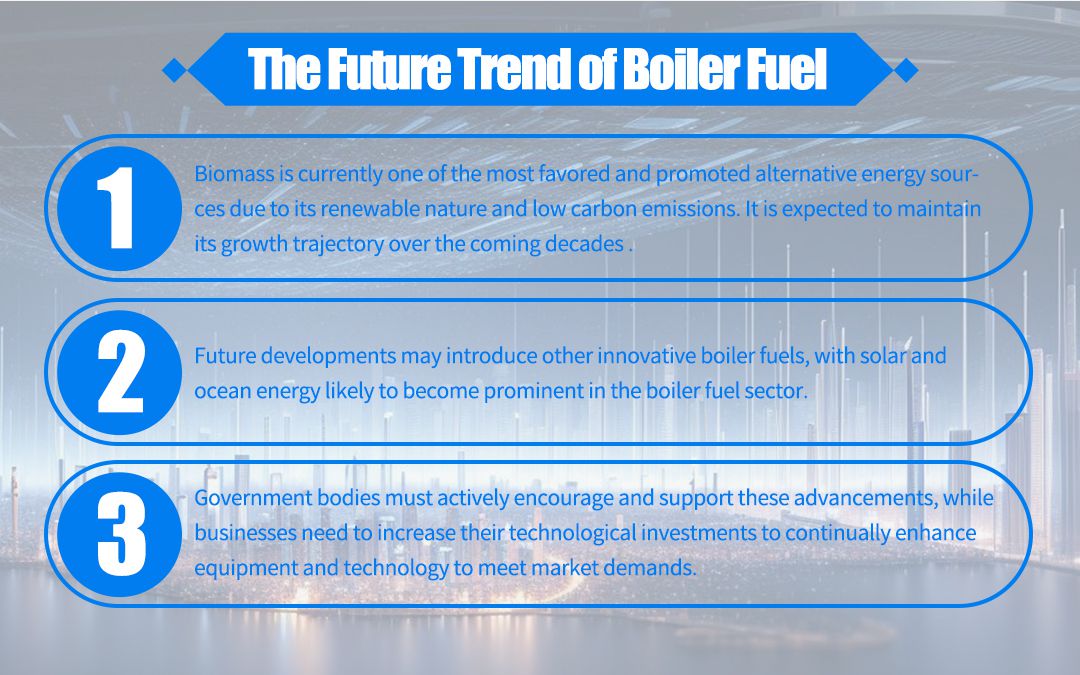
Boilers as important energy conversion equipment, in the industrial and domestic fields, play a pivotal role. With environmental pollution becoming a global concern, people are becoming more and more cautious in their choice of boiler fuel.
Biomass is one of the most popular and respected alternative energy sources. With the advantages of renewability and low carbon emissions, it is expected to continue its momentum in the coming decades and replace traditional fossil energy sources in some regions. As technology continues to advance, biomass pellets (e.g., wood chips, straw, etc.) can be more efficiently converted into electricity or other forms of clean energy, greatly increasing their range of applications and utilization efficiency.
In addition, other new and innovative boiler fuels are likely to emerge in the future. Solar energy, ocean energy, etc. are expected to become the new favorite boiler fuels in the future, which can be directly converted into electricity or other forms of clean energy.
However, not all regions are in a position to implement these changes, so government departments need to take active steps to encourage and promote these developments. At the same time, enterprises also need to increase investment in science and technology, and constantly upgrade the corresponding equipment and technology level to meet market demand.
Conclusion
The choice of the right fuel requires a combination of factors such as technical efficiency, economic cost, social impact, and relevant policies. Biomass, as one of the renewable energy sources, can fulfill energy needs while reducing negative environmental impacts. However, these advantages alone cannot solve the problem completely. We need to make informed choices based on specific situations and actively promote scientific and technological development to find more sustainable and environmentally friendly alternatives.
Therefore, when reviewing biomass versus other fuels, the most important conclusion is that we need to carefully weigh all factors and choose the most appropriate form of energy for the situation. Only then will we be able to provide sustainable energy solutions in the future and contribute to the planet? If you have any further questions about boiler fuel selection, please feel free to contact EPCB Boiler.
FAQ
Which boiler fuel is the most cost-effective?
Among the boiler fuels available on the market today, biomass is increasingly mentioned and highly respected. Compared with traditional fossil energy sources, biomass has advantages such as recycling and low carbon emissions. From a purely cost perspective, biomass already has the capital to compete with other traditional energy sources. In terms of environmental protection, biomass boilers are low-carbon emissions, zero-pollution energy, for reducing air pollution and human health has an obvious positive effect.
Although the current biomass pellet technology is increasingly improved and recognized by all parties, in the actual use of the process there are still some such as storage, transportation, and other emerging issues, and there are still differences in different regions (such as plains, deserts, or high altitude).
As technology and policy continue to evolve, we believe that biomass will play an even more important role in the future and eventually surpass traditional energy sources as one of the most cost-effective boiler fuels.
Which boiler fuel is the most environmentally friendly?
In terms of boiler fuels commonly used in the market today, they can be categorized into traditional fossil fuels such as oil, gas, and electricity as well as renewable energy sources such as biomass and solar energy.
Natural gas is widely recognized and considered one of the cleanest non-renewable resources compared to traditional liquid or solid fossil energy sources. It can be fully utilized for heating at high temperatures and emits virtually no pollutants during the ignition process. Some experts point out that although natural gas has a thermal efficiency of around 90%, there are still significant environmental concerns in terms of its absolute emission values.
In contrast, the biomass boiler can effectively solve the situation of traditional resources decreasing but also can avoid the large-scale mining brought about by soil degradation, water pollution, and other serious consequences. In the process of use, the biomass boiler emissions of carbon dioxide and raw material content are equivalent to the amount of carbon dioxide and do not produce additional increase. Therefore, it is recognized as a true sense of “carbon neutral”, and “environmentally friendly” clean energy.
In addition to biomass, solar energy is also recognized as one of the most promising, high-potential, low-consumption, safe, and non-toxic green energy sources of the future. It absorbs light energy through solar panels, generates electric current, and then drives a boiler for wall-mounted heating. Due to today's technological conditions, most people enjoy an adequate source of light, so its cost is very affordable, and environmental benefits are excellent.
What are the main considerations when choosing a boiler fuel?
There are several important factors to consider when choosing a boiler fuel. These include availability, boiler type, and environmental regulations.
1. Choose a fuel that is readily available in your area. This will not only ensure a steady supply to your boiler but will also help you save on transportation costs.
2. The type of boiler used. There are various types of boilers such as fire tube boilers, water tube boilers, and electric boilers. Each type has its specific requirements in terms of fuel usage.
3. Consider environmental regulations. With the growing concern over air pollution and greenhouse gas emissions, many countries have set strict regulations on the use of certain types of fuels. Natural gas and propane are known to emit relatively low levels of pollutants compared to other fossil fuels such as oil and coal. Biomass is also considered an environmentally friendly option because it utilizes renewable resources. energy demands limited resources and produces large amounts of greenhouse gases and pollutants during combustion, which seriously impact
In addition to these main factors, other aspects, such as cost-effectiveness and energy efficiency, must be taken into account when making this decision. In some cases, a hybrid system using multiple sources may be the best solution.
 Steam Boiler
Steam Boiler Thermal Oil Boiler
Thermal Oil Boiler Hot Water Boiler
Hot Water Boiler Steam Boiler
Steam Boiler Thermal Oil Boiler
Thermal Oil Boiler Hot Water Boiler
Hot Water Boiler Steam Boiler
Steam Boiler Thermal Oil Boiler
Thermal Oil Boiler Hot Water Boiler
Hot Water Boiler Steam Boiler
Steam Boiler Hot Water Boiler
Hot Water Boiler




























